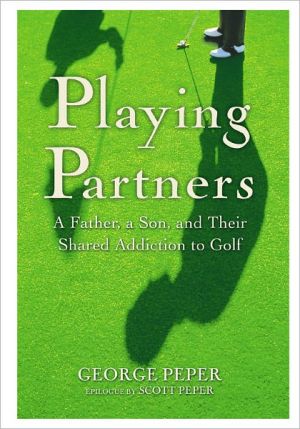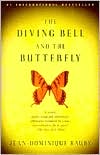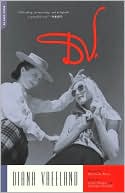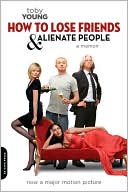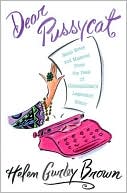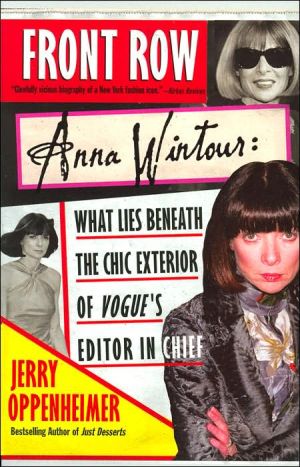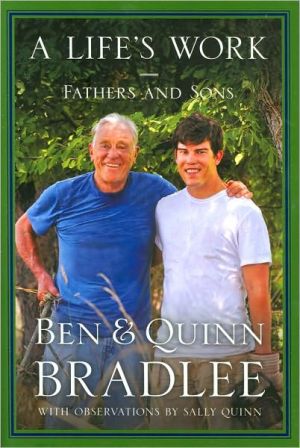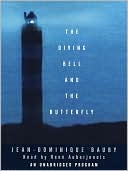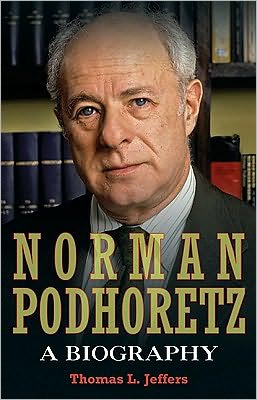Playing Partners: A Father, a Son and Their Shared Addiction to Golf
Teenagers are notorious for differences with their parents, but the author has been lucky to share a special friendship with his 18-year-old son, Scott.
Search in google:
This book focuses on the bonding and healing powers of golf between fathers and sons. Drawing from his own experiences, George Peper hits on the universal lessons of life, love, and golf learned through his relationships with his father and two sons.
Playing Partners\ A Father, A Son, and Their Shared Addiction to Golf \ \ By George Peper \ Warner Books\ Copyright © 2003 George Peper\ All right reserved.\ ISBN: 0446527076 \ \ \ \ Chapter One\ Blessed Onlyness \ My father's name was Gerhard. Now, imagine growing up in a middle-class New York suburb, just after World War II, with a father named Gerhard. I still shudder over that day in second grade when, in a primitive stab at ethnic profiling, Mrs. Sanford strolled the room asking each of us to recite the names of our parents.\ "Shirley and Bill," "Mary and Bob," "Eileen and Lester," chirped my homogeneous classmates at the William Street Elementary School. Then she reached my desk. "Doris and Gerhard," I mumbled quickly. "Doris and what?" "Gerhard."\ "Ah, Gerhard ... that's a good German name," she said, serving two dozen eight-year-olds their first oxymoron. At recess later that day my direst fears were realized when Dicky Smyers planted an accusative finger in my chest and said, "Your dad's a Nazi."\ Well, my father was emphatically not a heel-clicker. That said, he was about as American as apple strudel. Born in a small town in Schleswig-Holstein in 1903, he left home at age nineteen, hopping a steamship from Bremerhaven to New York in search of his fortune. At Ellis Island, when he reached the front of the line, they asked him his name. "Gerhard Peper," he said, pronouncing it as if it were a producer of pulp products.\ "No way, pal," said the immigration clerk. "Over here, with a name spelled like that, no one's gonna call you `Paper.' It's either `Gerry Peeper' or `Gerry Pepper,' take your pick." Dad opted for the marginally more euphonious "Pepper." However, he declined sprightly "Gerry," gutting it out in the New World with darkly thudding "Gerhard." In one way this turned out to be a canny move. By 1940 Americans would be vilifying every soldier in Hitler's army as a "Gerry." By that time my father was a card-carrying American. Had he fought in that war, he would have fought for the United States-against his own brother-but he was too old to serve. Ten years later, when I arrived, he was, again, too old to serve-as my father. At age forty-six he could have been my grandfather.\ Old and old school he was, a man who worked ten hours a day, six days a week his entire adult life. Fresh off the boat, he'd signed on as a carpenter's assistant, hoping to raise enough money to put himself through medical school. But economic reality forced him to abandon that plan in favor of a more affordable alternative-chiropractic college-moonlighting as a busboy during four years of schooling in Iowa. A week before graduation he threw a dart at the U.S. map and speared Pearl River, New York, "The Town of Friendly People," a tiny hamlet twenty miles north of Manhattan. In 1933 it was there that he set up a two-room office.\ One of his first patients was my mother. She was eleven years younger than he, a sophomore at Mount Holyoke College. Her major was German, and she had plenty in common with Dad, beginning with Teutonic blood on both sides of her family. In fact, during the nineteenth century her maternal grandparents had emigrated to the United States with the most astonishing of surnames: Peper. Yes, one-p-in-the-middle Pepers dangle from virtually every branch of my family tree. I'm not sure whether that makes me a hybrid or a mutation. I do know I'm the product of a union that somehow lasted forty-three years before my mother's death in 1977.\ Although stern and humorless on the surface, my father had a sort of oompah-band schmaltz that endeared him to just about everyone, beginning with Mom. He called her Toots (the truth is, he called all women Toots, but Mom was Toots #1); he hugged and kissed her openly and often and constantly proclaimed her "the star of my sleepless nights."\ In a similar way he schmoozed his female patients, who unfailingly fell for his little-old-winemaker charm. Although Dad claimed to hate socializing-and people in general-he was invariably the life of the party. He had a fine, strong singing voice, could waltz like Astaire, and spoke five languages fluently, albeit with a heavy German accent.\ A classic family story involves the lady of a certain age whose chiropractic treatment required spinal and cranial X rays.\ "Okay, Toots," said Dad as he fired up his machine, "are you wearing any bridges?" (False teeth apparently inhibit a clear view of the medulla and environs.) "Yes, of course," she said. "Then I'm afraid you'll have to remove them," he said, directing her to the lavatory. Moments later the woman reappeared, stark naked from the waist down. "Bridges," as pronounced by Dad, had registered as "britches."\ Language barrier aside, he was a terrific chiropractor. Although most of his patients came in search of relief from lower-back pain, he had success helping people with everything from epilepsy to multiple sclerosis. But he also knew his limits, frequently recommending patients to local physicians who in turn referred their sacroiliac sufferers his way. In a profession that has provoked unending skepticism Dad was legit: honest, caring, dedicated, and thorough.\ Personally, I never understood the whole chiropractic shtick. How manipulating a section of the neck or spine could possibly repair any internal malady was beyond me. My father once told me it was like turning on a light. "You flip a switch on the wall," he said, "and up on the ceiling a bulb goes on. That's what I do with the spinal cord." Kind of scary, if you ask me. I can attest, however, that throughout my twelve years of public school, I missed only a handful of days, largely due to Dad's knack of squelching colds and related ailments by means of a quick "adjustment."\ Since his office was attached to our house, members of the immediate family could be whisked in for checkups and routine servicing. Every examination was a two-part process. He'd begin by gliding a strange two-pronged instrument-sort of a pregnant magnet-up the back of one's neck. This produced a red-ink readout resembling a six-month chart of the Nasdaq. After a perusual of its peaks and valleys he moved to part two, which involved one of two ominous machines, known privately by me as Godzilla and the Rack.\ Godzilla was comprised of four or five spring-loaded leather cushions. It was powered by a groaning electric engine and angled up and down like a construction crane when my father stepped on a pedal at its base. In its at-rest position Godzilla inclined about twenty degrees below vertical. The patient boarded it, facedown in the firm cleavage of its paper-covered pillows. Then Dad hit the gas and down it steamed until parallel to the floor-adjustment mode.\ The Rack was more low-tech-a rigid Naugahyde chaise lounge on which the patient assumed a more or less fetal position. The Rack's only distinctive feature was a raised headrest with a small cavity into which one inserted the ear of Dad's choice.\ Once I was in position on either apparatus, Dad would cradle my head in his huge hands, sliding soft, puffy fingers ominously across my neck, temples, cheeks, and jaw as he searched for the perfect time and place to make his move. This unsettling foreplay could last anywhere from five to thirty seconds, depending on how quickly he found his inspiration. Then, with the suddenness of a lightning bolt, he'd snap his hands, usually causing an audible click inside my neck. Adjustment completed.\ "Now lie still for a couple of minutes," he'd say as my eye-balls returned to their sockets. Invariably, I'd fall fast asleep. By the next morning my earache, runny nose, sore throat, and/or cough was miraculously gone. These days, as I address my computer-three Aleves in my stomach and a back pillow at the base of my chair-I'm aching for one of those adjustments. On the flip side my father could inflict almost as much pain as he relieved. He was old-country strict, brooked no disobedience, and believed strongly in corporal punishment. Major misbehavior brought a few swift lashes from "the belt" or "the switch." The belt was not a major threat, since my father mostly wore suspenders, but the stick-a pliant, well-aged branch from one of our oak trees-was always within easy reach in the center of the kitchen resting ironically atop a kitschy "Home Sweet Home" sign.\ Dad's stubbornness was probably his worst quality. He never backed off, even when he was patently out of line and knew it, and he never took blame. The only time I ever heard him apologize to my mother was when he said, "I'm sorry, Toots, you're wrong."\ He and Mom had frequent and loud arguments on everything from politics to patio furniture. They were both highly intelligent, but Mom had more verbal finesse and she wasn't above using it in their debates. "It must be absolutely wonderful to be so sure of yourself all the time," she'd say. "I so envy you your state of perpetual self-confidence." He never had a response for that one.\ She was particularly fond of taunting him about his overeating. (At age twenty he'd had a swimmer's body-by forty he'd become a whale.) Remember that television show from the sixties, The Alfred Hitchcock Hour, which began with the famed director striding into his own ovoid silhouette? Dad could have filled in for Hitch, and he worked at that role, three squares a day.\ "My God, Gerhard," Mom would say as he tucked into pork chop number seven, "you're digging your grave with your teeth!" This invariably triggered a spirited exchange on the pros and cons of gluttony. It was Dad, however, who usually got the last if not best word, stomping from the room while delivering his bread-and-butter closer: "Toots, you can go shit in your hat!"\ Like most kids, I couldn't imagine my parents having sex, and in the case of our family the irrefutable evidence was meager. Married in 1934, Mom and Dad took eight years to produce my brother, Eric, and another eight to come up with me. One consequence was that Eric and I had separate and unequal childhoods when it came to paternal participation. Middle-aged Gerhard was an outdoorsman. He loved to hunt and fish, and he taught Eric to love those things, too. Together they disappeared for weekends to bag bass, birds, and bucks. When Eric came home with his first 14-point whitetail, it was one of the proudest days of my father's life.\ By the time I reached the Field & Stream years Dad was a senior citizen with arthritic joints, varicose veins, poor hearing, and a self-described "bum ticker." A year or so before my birth he'd suffered a heart attack that had brought an abrupt end to his wilderness trekking. There would be no hunting and fishing with George.\ Truth be told, that was fine with me. I hated summer camp, found the Boy Scouts vaguely homosexual, and never quite saw the delight in rising at 4:00 A.M. in order to bring about the demise of a duck. Unlike Thoreau, I am at two with Nature.\ Guns attracted me briefly, as they do so many boys, and one year I got an air rifle for my birthday. It was fun plugging tin cans and toy soldiers with those copper BBs. Then one day I drew a bead on a robin that had perched on a telephone wire near our house. Now, at a distance of fifty paces I had never hit anything, but this time I did: a thunderbolt to the bird's little skull. It was as if I'd shot myself. At eleven years old I'd become a cold and demented murderer. My hunting career ended right there.\ As for fishing I lack the requisite patience. As a hopelessly type A personality I don't stop to smell the flowers, let alone the fish. Results are what I crave, preferably immediate results. At a bare minimum I need the assurance of action.\ Sitting in a rowboat and staring at the surface of a lake is my idea of water torture. Ocean fishing can be pleasurable, of course, especially when I have a companion to hold the waist of my shorts as I lurch seaward and projectile-vomit my three most recent meals.\ Without question my most gratifying day as an outdoorsman came at about age ten, when from the end of a dock at Greenwood Lake, New Jersey, I caught precisely one hundred sunfish. I'd set myself a goal early that morning and had gone at it with disturbing zeal, molding a loaf's worth of Wonder bread into pea-sized pellets that slid easily onto the hook. (The most effective bait, I've found, is the kind that's equally palatable to both fish and fisherman.) All day long I horsed in those pathetic perch-tossing them back as fast as they arrived- until somewhere around Miller Time the centenary sucker hit the planks.\ Although I made a hundred conquests that day, in actuality I caught only about a dozen fish-the same dozen over and over again. After a while I came to recognize each glazed gaze and mutilated maw. They didn't seem to be having as much fun as I was.\ In any case, there was no outdoor life between George and Gerhard Peper, no bonding in the boondocks. In fact, not much in the way of shared recreation. Dad was, to coin a word, asportual. Having been raised in another culture, he had little affinity for American games. During my formative years his idea of leisure-time fun was a few hours of weeding the pachysandra, followed by some light hauling to the compost heap.\ I didn't miss his presence, except when it came to one activity: baseball. I loved baseball. In fact, between the ages of eight and twelve, I lived baseball. Whatever money I could scrounge went into the purchase of Topps baseball cards. They came in packs of six or seven, accompanied somewhat gratuitously by a brittle rectangle of bubble gum. No serious collector will ever forget those brightly colored wrappers, the sweet smell of the gum, the slick film of sugar that coated the top card, or those two-and-a-half-by-three- and-a-half-inch treasures themselves.\ Each pack was a new adventure, to be embraced with the pathetic fervor of a Super Lotto player. Praying for Hank Aaron or Al Kaline or Nellie Foxx, I'd invariably draw Don Blasingame or Tom Sturdivant or Felix Mantilla. But the big names popped up just often enough to sustain the addiction. I've often wondered what sort of marketing Machiavelli in the Topps offices decided how many Mays and Koufax cards to sprinkle into the flow, and just where and when to seed them. If you collected baseball cards, you didn't go halfway-at least I didn't. Each summer my consuming goal was to complete the collection. Judicious card management was thus important. I housed my collection in an old Dutch Masters cigar box that never left my room, and kept with it a checklist that showed cards procured and cards needed. The cards were rubber-banded by teams, with separate packs for rookies, all-stars, and other specials. The duplicate Blasingames never saw the box; they joined my traveling squad for flipping and swapping with friends.\ I fancied myself a better-than-average flipper, with a deft wrist flick that served me well in the game where a single card was propped against a wall and players took turns skimming cards at it, Frisbee style, until someone toppled the leaner and raked in the pile.\ \ Continues...\ \ \ \ Excerpted from Playing Partners by George Peper Copyright © 2003 by George Peper\ Excerpted by permission. All rights reserved. No part of this excerpt may be reproduced or reprinted without permission in writing from the publisher. \ \
